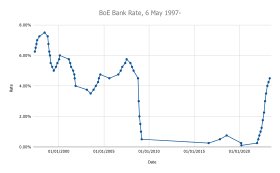Monetary Policy Committee

Interest rates since the Committee's inception
|
|
| Formation | May 1997 |
|---|---|
| Purpose | Determining monetary policy |
|
Chairman
|
Mark Carney (ex officio) |
|
Parent organization
|
Bank of England |
|
Staff
|
9 |
| Website | Monetary Policy Committee |
The Monetary Policy Committee (MPC) is a committee of the Bank of England, which meets for one and a half days, eight times a year, to decide the official interest rate in the United Kingdom (the Bank of England Base Rate). It is also responsible for directing other aspects of the government's monetary policy framework, such as quantitative easing and forward guidance. The Committee comprises eleven members, along with the Governor of the Bank of England (from 2013 Mark Carney), and is responsible primarily for keeping the Consumer Price Index (CPI) measure of inflation close to a target set by the government (2% as of 2016). Its secondary aim – to support growth and employment – was reinforced in March 2013.
Announced on 6 May 1997, only five days after that year's General Election, and officially given operational responsibility for setting interest rates in the Bank of England Act 1998, the Committee was designed to be independent of political interference and thus to add credibility to interest rate decisions. Each member has one vote, for which they are held to account: full minutes of each meeting are published alongside the Committee's monetary policy decisions, and members are regularly called before the Treasury Select Committee, as well as speaking to wider audiences at events during the year.
The Committee is responsible for formulating the United Kingdom's monetary policy, most commonly via the setting of the rate at it which it lends to banks (officially the Bank of England Base Rate or BOEBR for short). As laid out in law, decisions are made with a primary aim of price stability, defined by the government's inflation target (2% on the Consumer Price Index as of 2016). The target takes the form of a "point", rather than the "band" used by the Treasury prior to 1997. The secondary aim of the Committee is to support the government's economic policies, and help it meet its targets for growth and employment. That secondary aim was reinforced by then Chancellor of the Exchequer George Osborne in his March 2013 budget, with the MPC given more discretion to more openly "trade off" above-rate inflation in the medium run to boost other economic indicators. The MPC is not responsible for fiscal policy, which is handled by the Treasury itself, but is briefed by the Treasury about fiscal policy developments at meetings.
...
Wikipedia
